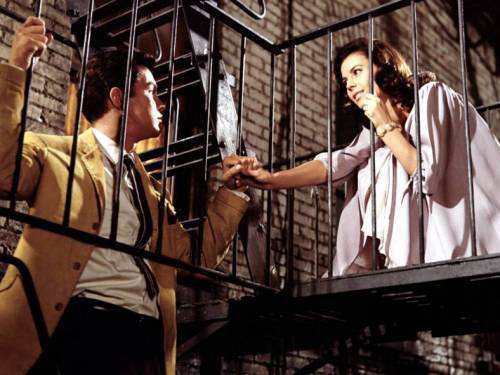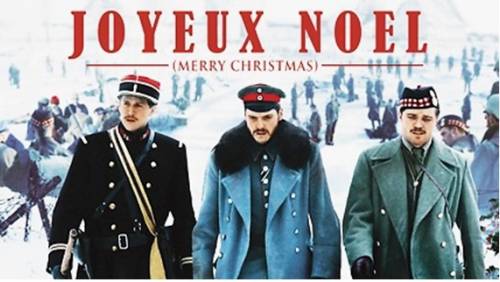Cinematic works capture the spirit of the season
by Ed McNulty | Special to Presbyterian News Service
LOUISVILLE — If you cringe each year at the saccharine, formulaic entertainment that Hollywood and TV foist onto the public during the so-called Christmas Season, here are four films actually worth your precious time. Two are Advent films of longing and hope, and two are Christmas Eve films focused on the power of love.
To go beyond mere entertainment, I have suggested some Scripture passages related to the theme and contents of the films for you to meditate upon. Watching and talking about one or more of these with others might be a good way to slow down this December before the frenzy of our culture’s Gods of Commerce exhaust you in the quest for the “perfect Christmas.”
 West Side Story
West Side Story
NR, 2 h 33 m, 1961.
Directors: Jerome Robbins & Robin Wise
Isaiah 11:1-9; 1 Peter 2:1-10
Based loosely on Romeo & Juliette and set in a Manhattan ghetto of the Fifties, the hostility between Italians and newly arrived Puerto Ricans is all too similar to the way many people in America and Europe feel today about immigrants. This is well expressed in the song sung by teenage gang members, “The Jet Song,” in which the gang takes on the role of the church by giving them a sense of belonging and of self-worth. But such good feelings are only for members—all outside the gang are enemies to be despised and rejected. However, ex-gang member Tony has moved beyond his old gang. Seeking broader horizons, he sings “Something’s Coming,” clearly an Advent song in which he expresses his hope for a better future. One of the song’s many telling lines declares, “I got a feeling a miracle is due.”
Tony meets and falls in love with Maria at a dance, but both know they face huge obstacles, he being Italian and she Puerto Rican. The two frustrated lovers sing, “Somewhere, there’s a place for us…” Its line, “We’ll find a new way of living, We’ll find a way of forgiving, somewhere…” parallels the Advent hope for Shalom, a world in which wolves and lambs live peaceably together. In the Gospels Jesus calls this “the kingdom of God,” but as we see in the film’s tragic ending, we still await that day — though there is a hint of it when, at the prompting of Maria, members of both gangs join to carry her lover’s body to its resting place.
Lyrics at http://www.westsidestory.com/site/level2/lyrics/lyrics.html
Smoke
R, 1 h 52m, 1995.
Directors: Wayne Wang & writer Paul Auster
Psalm 22:1-2; I Corinthians 1:26
This film, mostly set in a Brooklyn tobacco shop, also has an Advent theme in that most of the characters are seeking something better for themselves or others. Paul seeks relief from grief over his wife’s death by gunshot as she was walking along a street near the shop, a tragedy that block’s his writing, his sole means of income. Teenage Rashid is hiding from a gangster intent on recovering a bag of stolen money in the boy’s possession (he picked it up on the sidewalk as the gang was fleeing a robbery), plus the boy is seeking the father who had abandoned him years before. Ruby wants to borrow money from her ex-husband Izzy, the shop’s proprietor, so her addicted daughter can enter a drug treatment program—Izzy might, or might not, be the father of the young woman.
Christmas enters into the picture in the form of a bizarre story about loneliness and sharing that takes place on Christmas, which Izzy gives to Paul to end his writer’s block. (The film is full of such acts of grace.) There is also a fine spiritual insight in a scene dealing with a camera, photographs, and seeing (and related to Paul’s wife) that teaches the importance of slowing down and seeing what is passing before us—good advice for those of us caught up in the busy rounds of shopping and partying during December.
 Joyeux Noel
Joyeux Noel
PG-13, 2005 (French, German, English)
Director: Christian Carion
Isaiah 9:2-3; Luke 2:14
This film dramatizes in fictional form the details of that sacred night during World War One, December 24, 1914, when in a few spots along the long line of trenches and barbed wire, men on both sides set aside their weapons of hatred and death and celebrated the birth of love and life. As always happens when we allow the Spirit of God to control us, many moments of grace burst forth spontaneously. Men shared their drinks and candy; they joined together in singing; comrades were able to recover and bury their fallen friends; soldiers from three nationalities — German, French and Scots — join in a football game; an officer agrees to convey a letter of his counterpart to parents living behind enemy lines; and a clergyman conducts a Christmas Eve service.
Such behavior, of course, is anathema to those whose orders send thousands of men to their deaths. They regard the incident as treasonous because the soldiers’ “fraternizing with the enemy” will undermine their efficiency as the killing machines they were trained to be. Dire consequences, more akin to Good Friday than Christmas, follow.
Noel
PG, 1h 36m, 2004
Director: Chazz Palminteri
Hebrews 1:14 & 13:2; John 4:16b
This film was panned as “too sentimental” by many secular critics, but some people of faith found it a deeply moving exposition of the need for and the power of love in a cold and lonely world. Set in NYC, its interlinked stories include that of Rose, a long-divorced book editor spending the night beside the hospital bed of her Alzheimer’s afflicted mother; Nina and Mike, an engaged couple probably mismatched due to his overly jealousness; Artie, an old waiter still grieving over his wife and expecting her re-incarnation; and Jules, a young man so desperately lonely that he damages his hand in the hope that there will be a Christmas celebration in the hospital like the one he remembers when he was a boy spending the weekend in the hospital.
There is also the mysterious visitor across the hallway from Rose’s mother, Charlie, who bears out the film’s tagline, “Miracles are closer than you think.” As you reflect upon this film you might take out your hymnal and read, or better, sing, the third verse of “It Came Upon the Midnight Clear” that addresses the film’s wounded characters, “And ye, beneath life’s crushing load…” and ends with, “O rest beside the weary road, And hear the angels sing.”
This film just might help us also hear the song of angels as we navigate our own crowded roads during the Christmas Season.
My longer reviews of these films can be found at visualparables.org.
—–
Dr. Edward McNulty is pastor of the Blue Ball Presbyterian Church in Ohio and author of three film books published by WJK, and editor/reviewer of Visual Parables. His latest book is Jesus Christ: Movie Star.
![]() You may freely reuse and distribute this article in its entirety for non-commercial purposes in any medium. Please include author attribution, photography credits, and a link to the original article. This work is licensed under a Creative Commons Attribution-NonCommercial-NoDeratives 4.0 International License.
You may freely reuse and distribute this article in its entirety for non-commercial purposes in any medium. Please include author attribution, photography credits, and a link to the original article. This work is licensed under a Creative Commons Attribution-NonCommercial-NoDeratives 4.0 International License.
Categories: Presbyterian News Service
Tags: advent, christmas, culture, ed mcnally, holiday, movies, pcusa, presbyterian